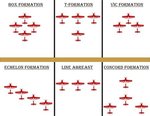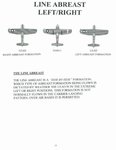- Thread starter
- #81
seesul
Senior Master Sergeant
The attackers launched rockets, then converged on the formation from 3:00 to 9:00 o' clock in
waves of 4 to 10, line abreast, and in "V" formations of 10 to 20, firing 20mm cannons and machine
guns, and brazenly flying through the formation as they completed their passes.
What does the connection 'line abreast' mean? Could anyone draw a picture of the formation please?
waves of 4 to 10, line abreast, and in "V" formations of 10 to 20, firing 20mm cannons and machine
guns, and brazenly flying through the formation as they completed their passes.
What does the connection 'line abreast' mean? Could anyone draw a picture of the formation please?



